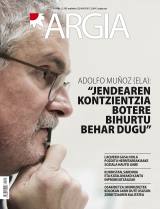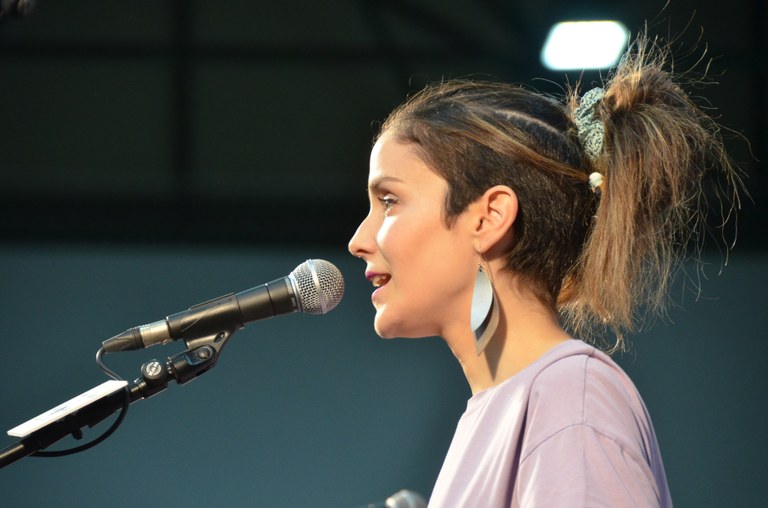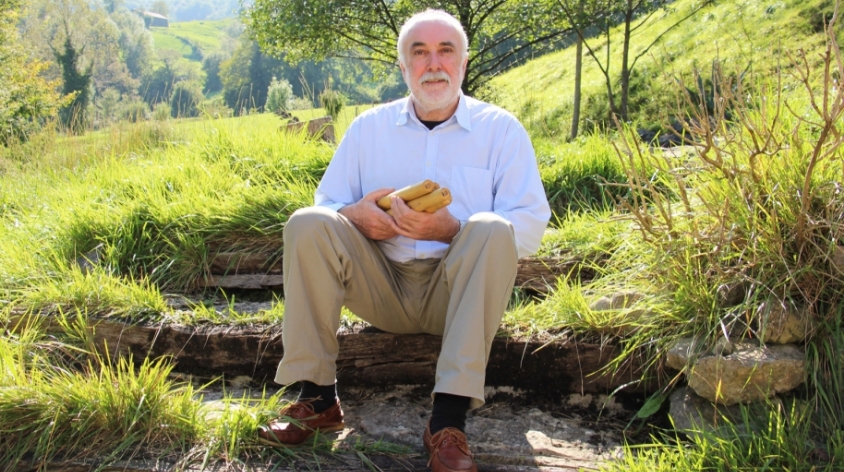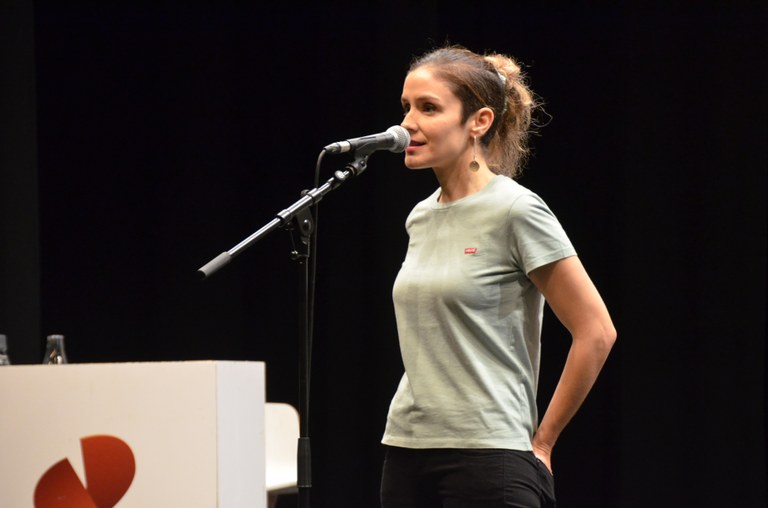The singing of oppressed peoples, minority languages
- Within the Europa project, the improvisers of Kurdistan, Sardinia and Catalonia have been singing along with the bertsolaris in Euskal Herria. Thanks to the help of the translators, the four traditions, the four languages, have come together onstage.
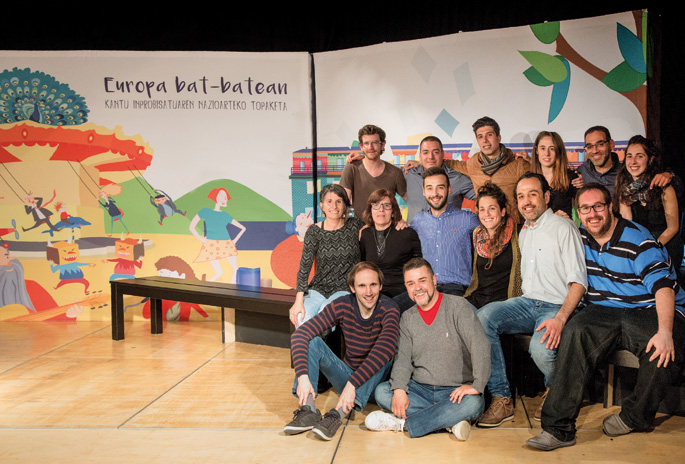
The International Meeting has allowed us to enjoy and know more about the other, and we cannot give up on it: We met, one by one, after giving the first action in Bilbao, with improvisers of three minority languages.
CANTADORI DE SARDINIA
Paola Dentoni: “The survival of our song and of the sardinero is linked”
The cantadoris Simone Monni and Paola Dentoni, from Sardinia, have sung with the accompanying voices Stefano Cara and Michele Deiana and the rhythm of the launeddas instrument in the Basque Country. Poetry to bolu’ is one of the strengths of sardinian, a sign of the island’s own culture.
What varieties are on your island?
In Sardinia there is more than one habit. Four variants are distinguished and you will only hear what we do in the south of the island. It's called a mutetto.
Accompanying the improvisers, the second voices are sung, basciu and against, with grave sound. What is your role?
Basciu and contra voices serve as a link between the verses launched by the improviser. In the mutettu longo modality they are even more important, as they are long performances and the second voices divide the story into sections.
There are contests and songwriters' meetings, right?
Yes, they are organised mainly at the village festivities. They get less than before, but those who stay stronger are also broadcast on TV. What is most appreciated in competitions is to express well the metaphor of our song. The key is to explain the theme or argument established by metaphors. The argument is usually the trade of the Basque bertsolaris. All supported by the metric and rhyme.
Today, is the Canteran tradition transmitted from generation to generation?
Unfortunately, it is withdrawing. This is where very few young people start.
The other singer who has come with you, Simone Monni, is very young.
Yes, we wanted it to match those few young people there. In addition, the case of Simone is very revealing, it gives us hope. In his house they only spoke in Italian, but his father and brother liked improvisers and Simon wanted to learn. Little by little, they started to become interested, and by the way, sardinero has also returned to their homes.
Do you think the destination of the singers and sardinero are related?
Yes, of course, the survival of our song and of the sardiner are united. To create chanting, you need people at home who speak in sardines. The habit of speaking in sardines is being lost, particularly in Casteddu, Tàtttari and the great peoples. In case of loss of sardinism, the main base of the cantadoras will be lost.
DENGBÉJs KURDISTAN
Zinar Ala: “Improvisation has saved the history of the Kurds”
In Kurdistan, the tradition of improvising dengbêj is deeply rooted. They are very poetic verses, as demonstrated by Zinar Ala dengbêja, who lives in Germany. Their culture of oral transmission makes improvisers an essential tool for preserving the identity of the Kurds.
In what environment or situation do you improvise in Kurdistan?
Above all, improvisers meet at night celebrations to enjoy music, wine and verses. A Dengbêj usually begins to tell stories. Then another gives continuity to history. Young people also maintain tradition.
Weddings are also frequent. They sing about the virtues of boyfriends or the joy of the family. There are usually supporters of the groom and the bride and a kind of struggle arises.
On the other hand, improvisation is a common practice among people working in the fields. One worker throws some stanzas and, while still working the ground, the others think about the answer.
You are also the repositories of the history of the Kurds.
It can be said that this improvisation has saved the history of the Kurds. In fact, little has been written about our history, ours is oral culture. The Dengbêj have passed from generation to generation our knowledge. It's a place where expressions, old stories, etc. come together. And it's beautiful how the rhymes and the wisdom of the people are mixed in the stanza.
Do you have any plans to keep the habit of improvisers?
We want to revitalise Kurdish improvisation, but that requires institutional help. The Town Hall of Amed (in Kurdistan, dependent on Turkey) finances, for example, the residence Kantarien Etxea in the old town of the city: There they take former improvisers and give them a small income, as there are hardly any retirement pensions in our country. This type of spaces will contribute to the diffusion of the customs of the Dengbêj. But, apart from the municipalities, the other institutions do not cooperate, the Turkish State does not want to know anything.
CATALYST GLOSSERS
“It takes moments to get to know each other, but without the merging of the two traditions”
The Catalan countries are very rich in improvisation, as most of the islands and regions have their own variant. Christian Simelio and Anaís Falcók, who have answered our questions, have brought to the programs of Bilbao and Hernani the tradition of the corrandists, accompanied by the small sound of Gerard Díez. In Donostia-San Sebastián and Pamplona/Iruña, the Ferriol Macip and Mireia Mena glossaries have participated. As the photo of the report has been obtained after the program of Donostia, Macip and Mena are the ones that appear in the report.
Which of the improvisations in the Catalan countries is yours?
ANAÍS FALCÓ The improvisate has its strongest tradition on the island of Menorca, where they improvise with three singers and a guitarist. In Mallorca, however, there has been a certain resurrection, as they sing without instruments. In the Valencian Country, the singer is in charge of chanting the bertso that the verseador thinks. Further north, in the lands of the Ebro, there is the tradition of the young man, a man who improvises at parties and weddings, but now there are also women.
Finally, there are corranists, that is what we do. Its origin is Catalunya Vella, in the regions north of the Llobregat River. Traditional Corrandists sang both spontaneous and perched songs, and what's more, we can't guarantee that they actually improvised it, because no direct information has been gathered about it. The tradition of the corrandists has been revived and now we improvise it many times.
There is a special link between Euskal Herria and Catalonia, both politically and culturally. Would closer contact in the improviser field be enriching?
CHRISTIAN SIMELIO Oppression has united us and let us take advantage of it to do things together. Euskal Herria is the cathedral of improvisation, more such meetings are needed. However, that does not mean that in Catalonia we have to copy the Basque Country in detail. We have our melodies, our style. It takes moments to get to know each other, but without the merging of the two traditions.
Do they organize championships in Catalonia?
A.F. : There are popular prizes, but they don't have an echo from those here. The biggest is that of the Sabadell festivities, and also rise to the stage, in a festive atmosphere, those who have never sung in public.
C.S. : Many times, we want to create the competition by copying Euskal Herria. But the truth is, the corranist doesn't have that tendency to challenge. I do not know to what extent we should adopt the model of Euskal Herria, we have our style. There are, however, many views on this.
Do you work with boys and girls to maintain tradition?
A.F. : Workshops are held in schools, but not so much to create good corrandists, but to help develop language and personal skills. Our improvisation is part of a larger creation: in an event where there is singing, dance and music, it is also improvised. Attempts are made to improvise itself, certainly taking the Euskal Herria model, but it is difficult to distinguish it from the other elements.
C.S. : Albert Casals wrote the thesis entitled Corrandascola. He proposes a learning program of improvisation at school that serves to work in Catalan. Thanks to Corrandascola, some music or Catalan teachers see improvisation as an interesting tool for the classroom. We are also sometimes called to do workshops and demonstrations in schools.
A.F. : Kids know what a corrandist is, but it's hard to get a bigger interest, because there are no models. We're talking about a few people. There are no strong referents, such as the high-level bertsolaris in the Basque Country.









